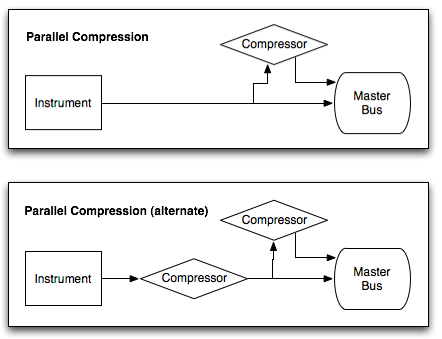
Advanced Overcomplication: In Practice

A couple weeks ago I talked about some of the myriad methods of employing compression in mixing. Today I’m going to talk a little about how I’m making things more complicated in pursuit of my live mixes. In practice, I’m actually doing a hybrid of the different compression methods mentioned in the post. Some of these are conscious choices, but some have just evolved over time.
First up would be Traditional Compression. I tend to use this on a lot of my inputs, but primarily on vocals, bass, kick and snare. In a limited situation, these are going to be the first things I insert them on. I might not turn them on right away, but these are probably where I’m going to want them to even out the bass and vocal and then get the drums punchy. On the Venue I have access to a compressor on every channel, and I might add a little here and there on inputs that seem like they’re going to get out of control at times like on a keyboard or guitar that’s all over the place dynamically.
Next up would be a mix of Parallel, Serial, and Multi-bus compression. I started with the Parallel compression which in my setup also makes use of serial compression thanks to the traditional compression on individual inputs. Drums and vocals both get parallel compression treatment by routing the inputs to a group(the parallel compression bus) as well as to the Master Bus. The parallel compression can be colored as long as I like the color. The stuff on the drums just makes them punchier and helps them cut. The stuff on the vocals continues to even them out and help get them on top of everything else. I don’t know exactly what it is, but there is something about the sound of compression on a vocal that just feels right to me. It’s important to me that the vocal stuff doesn’t sound overdone, but it can be overdone as long as it doesn’t sound that way. There’s a fine line between sounding over-compressed and sounding right. I think in modern music where so much of the instrumentation is compressed, having the vocal compressed can help it sit better in with the band while also making it easier to push it out on top and keep it there.
The rest of my instruments also generally get routed to a group with like instruments(ex. keys, acoustics, electrics, etc.) which I might use a compressor on. When I use compressors here, it probably falls more into the Multi-bus compression methodology, but not quite the same. I typically have a comp on my keys group, but the goal here is more of a transparent thing. I got started here partly to simplify things, but also in part from Michael Brauer’s multi-bus methods. I actually calibrated the comp on the group using one of Brauer’s methods. I might also compress the guitar group(s), but typically if I do anything to guitar I do it on the channel. When I do something on the bus it’s typically more about what is going to be the easiest way to get things under control. It can be a lot easier to manage things on a couple groups than on a lot of individual channels. I also like it because while I have the ability to do just about anything I want to on my current rig, it’s important for me to be able to still get results that are acceptable to me if I’m working in more limited situations.
One thing that’s important to understand is what can happen if you use groups/busses that have compressors on them. If you use bus compression and push the channel fader up on an input(s) feeding that bus, you will in turn hit the compressor harder. Sometimes this might be desirable, but I know that I’ve had problems in the past pushing guitar inputs up to boost a solo or lead line only to detrimentally compress it harder. In these situations, sometimes it might be better to push the bus up and then cut some of the other inputs feeding it if neccessary. It can make things a little more complicated which sort of runs against the whole reason to do the bus compression in the first place, but it’s just something to keep in mind.
When it comes to compression, I figure just because I’ve got access to everything doesn’t mean I should use it, however, I also feel like just because a bunch of folks might call it overkill doesn’t mean I shouldn’t use it. I always try and keep the end goal of the music in mind, and I’m not afraid to turn things off if they don’t work or on if it will take things up a notch. Compression does more than just control a dynamic level; it can also affect tone so it’s important for me to keep that in mind whenever and wherever I’m using compression so that I can quickly track down problems.

 Previous Post
Previous Post


